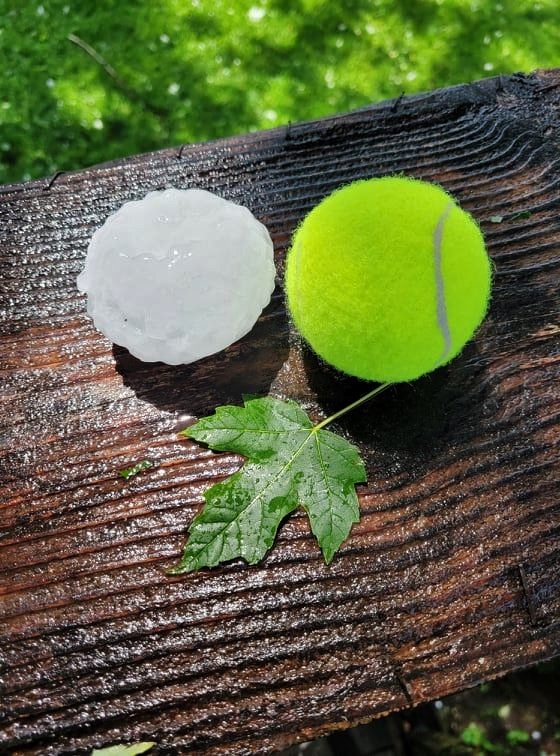Back Home by Chris Hardie
» Download this column as a Word document
» Download the photos that accompany this story
» Chris Hardie’s headshot
Severe weather goes part and parcel with summer — and this year is no exception.
Recently, tornadoes and severe thunderstorms swept through the state of Wisconsin, capping several days of unsettled weather. We had a few wind gusts — including one that knocked down my pallet fence that keeps our farm animals contained; they just don’t make twine like they used to. But we escaped serious damage.
We had heavy rain and a little bit of hail — but nothing like the folks in North Bend, just 8 miles to the south, located along the Black River between Melrose and Galesville.

North Bend has been a hotspot for hail this summer. Resident Deanna Lisota said that on July 27 hailstones almost the size of tennis balls fell on her house — which had just undergone repairs to the roof and siding from a hailstorm in May.
“This time the roof cap and the roof valley, more siding, and all the gutters and downspouts (were damaged), Lisota said, along with grills and outside furniture. “My poor plants … both times. Thank God we have good insurance.”
The cars were parked inside the garage.
Lisota shared a photo of a hailstone next to a tennis ball — which is on the list of comparable objects that range from pea to grapefruit. The official diameter of a tennis ball is 2.575 inches and the hailstone is pretty close to that.
The National Weather Service said the largest hailstone recovered and measured in the United States fell June 23, 2010, in Vivian, S.D. — with a diameter of 8 inches. It was an ounce under 2 pounds.
That might just be heavy enough to knock some sense into me.
Harmon School update
Several readers sent me messages providing more information about the former Harmon School in rural Ettrick, where two brick outhouses still stand that I wrote about recently. It turns out there is a connection to a distant relative of mine.
Sondi Mahoney said she had just read my column about the outhouses when she visited her mother.
“It was a serendipitous moment when I saw my mother had a new book at her home, ‘Many and Memorable: A History of 110 Rural Schools of Trempealeau County’ put out by The Trempealeau County Historical Society, not an hour after reading your article,” Mahoney wrote.
The Harmon School was for grades 1-8 and operated from 1916 to 1942, according to Mahoney’s great-aunt Mary Mack Walter, who taught there for eight years and contributed an essay to the book in 1986.
Now for the connection to the Hardie family.
Mahoney said her mother told her the Harmon School teachers often boarded at her family’s farmhouse — which at the time was owned by Arthur and Louisa (Salzwedel) Hardie and later by their daughters Ida, Ella and Cora, and then by Mahoney’s grandfather Jim Mahoney.
“I had noticed the names of various young women listed in state and federal censuses as ‘boarder’ living with the Hardie-Mahoney family during that time period, when doing genealogical work,” she said.
Reader and distant cousin Gordon Waller added to that thread, writing, “My teacher for my eighth and last year in the Glasgow School was Ruth Salzwedel, who was an older sister of Louis Salzwedel that you mention as a recent owner of Harmon School.”
Arthur Hardie was my great-great-uncle, the eighth child of James and Margaret Hardie. He married Louise Salzwedel. Their daughter Ella married Dennis Mahoney, father of Sondi Mahoney’s grandfather James or Jim.
Arthur’s niece — my great-aunt Mae Hardie — was a longtime teacher at the Glasgow School and other local schools.
Another reader told me that parts of the school — including the floor — were used in the construction of a house in rural Ettrick. So, apparently, more than the brick outhouses from the Harmon School still survive.
I always appreciate reader feedback and comments — especially when it tells, as the late Paul Harvey would say — the rest of the story.
Chris Hardie spent more than 30 years as a reporter, editor



